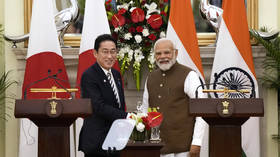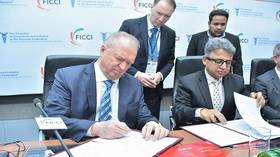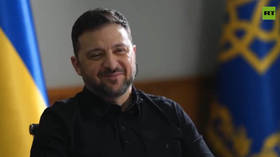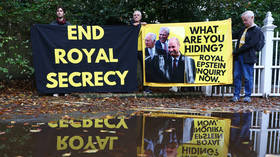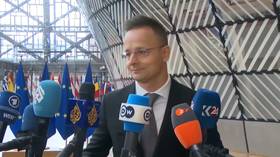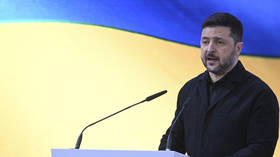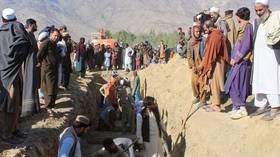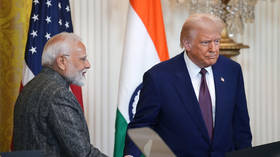‘Posterity will remember Modi as architect of modern India’: An RT interview on how the Indian ruling party changed the country
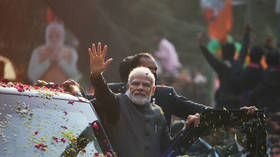
Ajay Singh is a veteran political journalist featured in some of India’s leading publications. He has had formal interactions and informal discussions with many of the top Indian leaders and administrators through the years and has closely followed the evolution and rise of the ruling Bharatiya Janata Party (BJP), the biggest political party in the world.
Singh’s recent book, ‘The Architect of the New BJP: How Narendra Modi Transformed the Party’, is an in-depth look into the BJP’s phenomenal growth to a 180-million-member political organization since its founding in 1980. Singh has been the press secretary to the president of India since 2019. He worked with ex-President Ram Nath Kovind and the incumbent, Droupadi Murmu, the first tribal and second woman to hold the highest office in the country.
Singh spoke to RT about the inspiration for the book. “As a journalist, I had been following the BJP’s growth for a long time. I read books on the party’s expansion. In the meantime, I read a book – ‘Party Building in a New Nation: The Indian National Congress’ – written by a renowned US political scientist, Myron Weiner, on the growth of the Congress. The book is a classic study on how a party grew in the post-independence phase and dominated the political scene for decades on end. The book gave graphic details on how party building is quite akin to building an army or any other vibrant human organization. I took a cue from that book and started researching on the phenomenal growth of the BJP under the leadership of Indian Prime Minister Narendra Modi.”
Singh first met Modi in 1995 at the annexure of Indian Parliament in New Delhi where the party’s national executive was then held. Since then, Singh says, Modi’s contribution has been significant in galvanizing the BJP as the largest political party in the world.
“Modi has applied conventional and unconventional methods to expand the organization, which now dominates the political scene in the same manner as the Congress did in the 1960s and 1970s. But unlike the Congress, which ignored the organizational structure and concentrated on the charisma of one family (the Gandhis), the BJP organizational structure is robust. It can sustain the party for long,” he said.
Modi’s biggest strength, according to Singh, is that he has captured the hearts and minds of millions of Indians. His popularity rating has been unmatched, despite being in power for nine uninterrupted years in a country where anti-incumbency runs deep.
“It’s not nine years but 21 years if you count his days as the chief minister of Gujarat. He is one of those rare politicians who reaps the benefits of a pro-incumbency factor. He is exceptional in the sense that he carried the pro-incumbency factor even at the national level. The obvious reason is that people place complete trust in him. That is a unique achievement,” Singh explained.
The book takes a unique approach by drawing on the accounts of people with whom the Indian leader has interacted in public life or otherwise through the years.
Singh spoke about sourcing the materials for the book.
“This book was only about the organizational skills of Modi. I dealt with those skills of organization building. The book is in no way a biographical account. I met most of those people who had closely watched Modi as an organization man.
“Interestingly, the Rashtriya Swayamsevak Sangh (RSS), the ideological parent of the BJP, has legions of organization builders such as Dattopant Thengdi, Eknath Ranade, Nanaji Deshmukh, Lal Krishna Advani, and Kushabhau Thakre. He largely borrowed from those stalwarts and introduced his own innovative methods of organization building. The book is focused on that aspect.”
Many political pundits have compared Modi’s path to widen his party’s base in Gujarat and his style of functioning as more akin to a corporate boss than a head of state, and very unlike some of his immediate predecessors. But Singh has a different take on this.
“I think it would be grossly wrong to compare an Indian PM with a corporate boss. The kind of diversities that characterize even the smallest Indian state, let alone the country, is beyond the imagination of any of the biggest commercial undertakings on Earth. If you read my book, you will find that right from the beginning of his career in public life, his political conduct conforms to a pattern. And he has always found short-term political gains expendable to long-term public good. That is the reason why he remains the most trusted leader in people’s perception,” he explained.
Modi has unshackled the BJP from far-right Hindu politics and broadened the base in the saffron party’s appeal in remote parts of the country such as the northeastern states, many of which have a Christian majority.
Singh said, “his innovative methods of party expansion came in handy for the BJP. In Assam, he roped in Himanta Biswa Sarma from the Congress and made him an icon of the BJP. Similarly, he broke new ground through alliances in other northeastern states which were considered to be a ‘no-go’ area for the BJP till about a decade ago,” he said.
Can the BJP win over the last few frontiers under Modi, including Bihar and Odisha in eastern India and large parts of southern India, especially Tamil Nadu and Kerala? The ruling party hasn’t been able to create much of an impression in spite of completing two terms in the federal government next year.
Singh declined to hazard a guess. “In a diverse country like India, any prediction of this nature will be untenable. Only a decade ago, who would have believed that Assam and Tripura would turn into an impregnable bastion of the BJP? Similarly, the party won substantial Lok Sabha [the lower house of Parliament] seats in all the states that have been mentioned. There are several variables that are at play in elections. But the BJP’s organizational strength has grown by leaps and bounds in these states.”
Many critics have questioned Singh for glossing over the 2002 Godhra massacre and the subsequent anti-Muslim riots. Did the author deliberately choose to ignore the pogrom?
He set the record straight: “As I have mentioned in the book and want to repeat it again, my focus was on the organizational skills of Modi in expanding the party to a phenomenal level. I retained that focus only.”
What does the author think about how posterity will remember Modi? “It’s up to history to evaluate a towering personality like Modi. But to my understanding, he comes across as a combination of ‘saintliness’ in personal conduct with a strong sense of ‘pragmatism’ in public conduct. Posterity may remember him as the architect of modern India,” Singh concluded.
